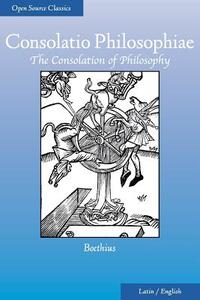You need to sign in or sign up before continuing.
Take a photo of a barcode or cover
challenging
informative
reflective
slow-paced
It is immediately apparent why this book caused such a ruckus throughout the Middle Ages. It is a fascinating reflection on the age old question of pre-determinism, free will, fortune, and the placement of human rationale.
To show I read it, Providence brought me to buy this book (zero recollection, I have had it years at least). Free Will brought me to take it off the shelf a few days ago and read it. Very satisfying.
Delighted by the "perfect" timing.
Delighted by the "perfect" timing.
emotional
hopeful
reflective
fast-paced
informative
inspiring
reflective
slow-paced
In brief...Boethius has been a successful man, but is imprisoned and sentenced to die. While awaiting his end, he is visited by Dame Philosophy, a flame of his youth, who guides him through (re)recognizing the simplicity of happiness.
The first three books are quite good, walking through the idea that a person need not, or really should not, consider their circumstances in determining their contentment. A life well lived is not necessarily a life materially lived - once you jump on the wheel of fortune, you can't choose to slow it down or get off. The last two books involve the typical 'logical argument' about Providence and the eternity of god. There's no use making these arguments to me, and if anything the attempts at making god's existence logical are humorous.
His philosophy of achieving bliss in the here and now is quite different from Christian teachings in more modern times. The marked difference between the 'universal' philosophy of Books I-III and the 'Christian' philosophy of Books IV-V makes the latter part appear a form of apologia. There appears to be some evidence (via the Introduction) of the questioning of Boethius's faith which makes this idea stronger.
The first three books are quite good, walking through the idea that a person need not, or really should not, consider their circumstances in determining their contentment. A life well lived is not necessarily a life materially lived - once you jump on the wheel of fortune, you can't choose to slow it down or get off. The last two books involve the typical 'logical argument' about Providence and the eternity of god. There's no use making these arguments to me, and if anything the attempts at making god's existence logical are humorous.
His philosophy of achieving bliss in the here and now is quite different from Christian teachings in more modern times. The marked difference between the 'universal' philosophy of Books I-III and the 'Christian' philosophy of Books IV-V makes the latter part appear a form of apologia. There appears to be some evidence (via the Introduction) of the questioning of Boethius's faith which makes this idea stronger.
challenging
reflective
slow-paced
challenging
informative
reflective
medium-paced
Very interesting read. I feel that I have only digested 10% of what it means!






